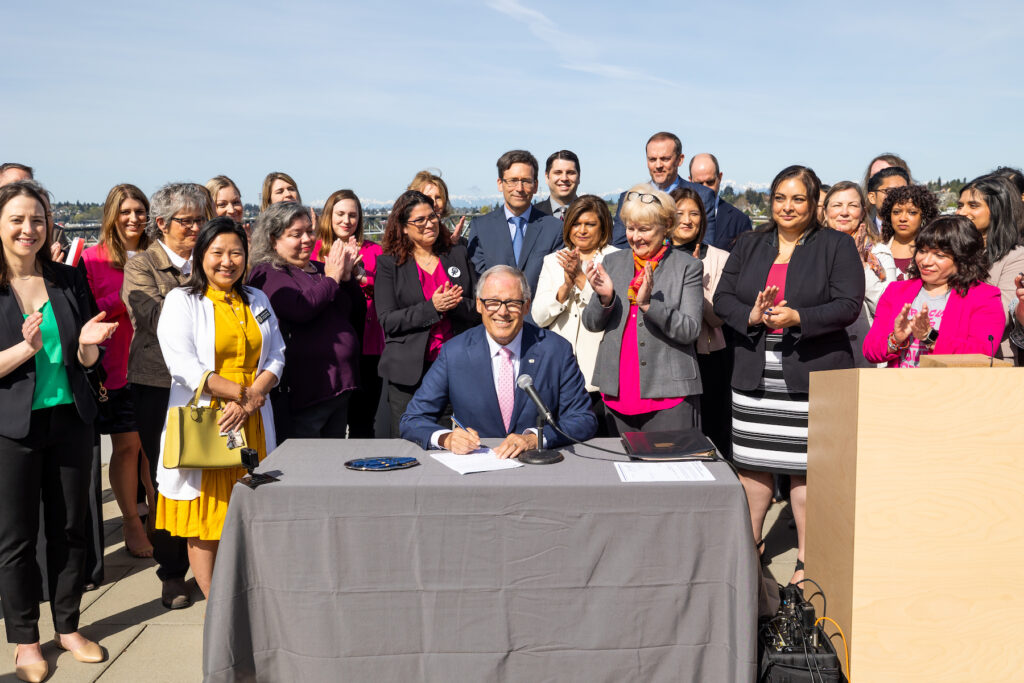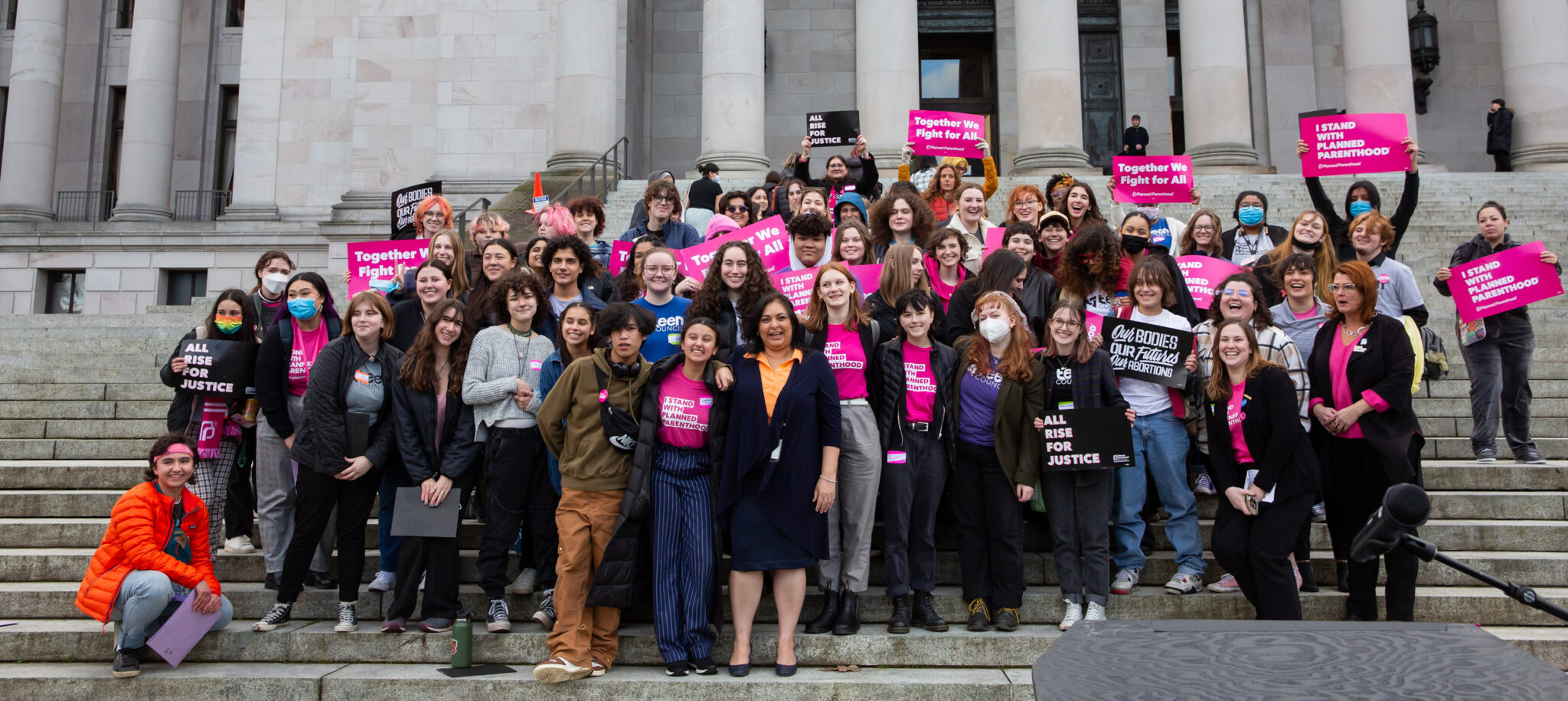When a judge in Texas issued his ruling invalidating the FDA’s approval of abortion pill mifepristone on April 8th, Karen Keiser ’69, MSJ ’73 was outraged.
“It was ridiculous,” the Washington State Senator said, “that a federal judge having no medical information and accessing no information that was available to him just [ruled] based on legal fiction, in my opinion.”
Mifepristone is one of two pills that are used in over half of the abortions in the United States. Rolling back the drug’s approval, after 23 years, could make getting an abortion difficult even in states where the procedure is still legal.
In his ruling, Trump-appointed U.S. District Court Judge Matthew Kacsmaryk of Amarillo, Texas, wrote that that “women who have aborted a child — especially through chemical abortion drugs that necessitate the woman seeing her aborted child once it passes — often experience shame, regret, anxiety, depression, drug abuse and suicidal thoughts because of the abortion.” He argued that the FDA had improperly approved the drug and that it should no longer be on the market. The FDA has strongly disputed this argument, pointing to over 100 studies showing the safety of mifepristone and that the rate of serious complications is less than that of childbirth (0.3 percent compared with 1.4 percent).
Less than an hour after the ruling in Texas, U.S. District Court Judge Thomas O. Rice in Washington state sent the opposite message with an order that blocked the FDA from making any changes to the availability of mifepristone. A couple of weeks later, the Supreme Court ruled that the pill would remain widely available for now. But the decision is temporary; the case is likely to make its way back to the highest court, after the Fifth Circuit court—made up of three Republican-appointed judges—hears the appeal. Arguments started May 17th, and it could take weeks before the circuit court issues its opinion.
Keiser and many of her fellow lawmakers, including Senator Manka Dinghra ’96, have been working since Trump’s election to ensure that Washington state safeguards women’s and LGBTQ+ individuals’ health. As the Texas case was underway, they, along with several members of the Washington State legislature and reproductive rights advocates, met in the Washington state governor’s office to hatch a plan to ensure access to mifepristone.

“We like to innovate,” Keiser said. “When this ideological judge had this case before him, we saw the writing on the wall, and we were looking around for solutions.” Realizing that the Department of Corrections had the ability to buy drugs for inmates, the governor’s office seized the chance to purchase a three-year supply of mifepristone under legislation sponsored by Keiser and Rep. Jessica Bateman on April 4th, just days before the Texas case was decided.
Representing two different generations of Cal grads, Keiser and Dhingra feel a kinship when fighting for abortion rights. Keiser completed her undergraduate degree in political science during the tumultuous 1960s, post-free Speech Movement but during the People’s Park era. Dhingra attended during the calmer ‘90s (“I mean, we had the naked man,” she laughed), but still she felt stirred by the spirit of activism.
“That long history that Berkeley has of activism and standing up, that permeates people,” Dhingra explained. “I do believe Senator Keiser and I both bring that kind of energy and those values and make sure we’re standing up for everyone.”


Keiser says they are following a proud tradition. “We have a real culture in our state of women’s reproductive freedom,” she said. In 1991, decades before Roe v. Wade was overturned, Washington state passed its own right to abortion by initiative.
Buying mifepristone is not the only recent step the state has taken. Keiser and Dhingra took the lead early this year on a legislative package that includes bills to protect patients and providers from prosecution, eliminate cost sharing for abortion care, protect providers from license suspension, increase funds to clinics seeing an influx of out-of-state patients, and keep personal health data—such as from period-tracking apps—private.
“You, theoretically, could have an app that sold information that said all these women stop having their period, and three months later, these women start having their period again, which means they had a miscarriage or they had an abortion,” explained Dhingra, who sponsored the My Health My Data bill. “So we started really thinking about all the personal data that’s out there that’s not protected.” The bill requires businesses to get consent to collect sensitive health data and gives users the ability to revoke their consent retroactively.
Since the overturning of Roe v. Wade, 36 states have passed abortion restrictions, and the number of legal abortions has decreased by over 6 percent. But public support for abortion has remained steady: In 2022, 62 percent of Americans believed that abortion should be legal in all or most cases, compared with 60 percent in 1995. Despite that, Republicans in Washington are sticking to party lines in fighting for restrictions, many citing personal religious beliefs.
“I think decades ago they made that part of the platform and that has not been updated. I do believe that they are completely on the wrong side of the issue. They’re on the wrong side of public opinion, the wrong side of what the majority of Americans want,” Dhingra said. “Unfortunately, instead of taking another look at it, they’re doubling down.”
In Washington state, party representation has been critical to recent decisions. Seven years ago, the state’s Democratic senators were in the minority. In fact, Dhingra’s first bid for office in 2017 flipped a seat, giving Democrats full control of the legislative chamber and the governor’s office—a majority that allowed them to pass this package of bills despite Republican opposition.

Next, Keiser wants to add abortion rights to the state constitution. She thinks it can pass, but Dhingra is not as optimistic. They would need a two-thirds majority to change the constitution; currently the Democrats hold 29 of 49 state senate seats. Sending it to a vote takes a lot of work—from filing paperwork to gathering signatures—by pro-choice advocates who are already burnt out.
Still, the two women are proud of what they’ve done so far.
“It is unfortunate that we are in the place where we have to think through these things and be very creative and try to counteract what we’re hearing from other states,” Dhingra said. “But I think we are in a good spot in Washington, and I’ll thank my excellent education that I got from my colleges for that.”



















